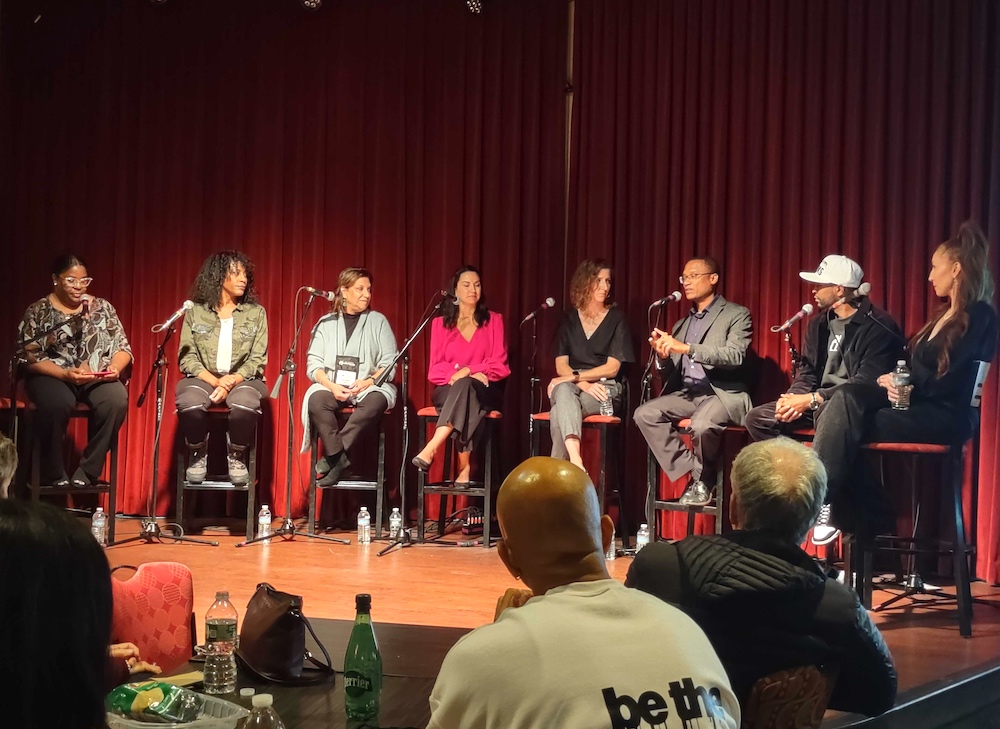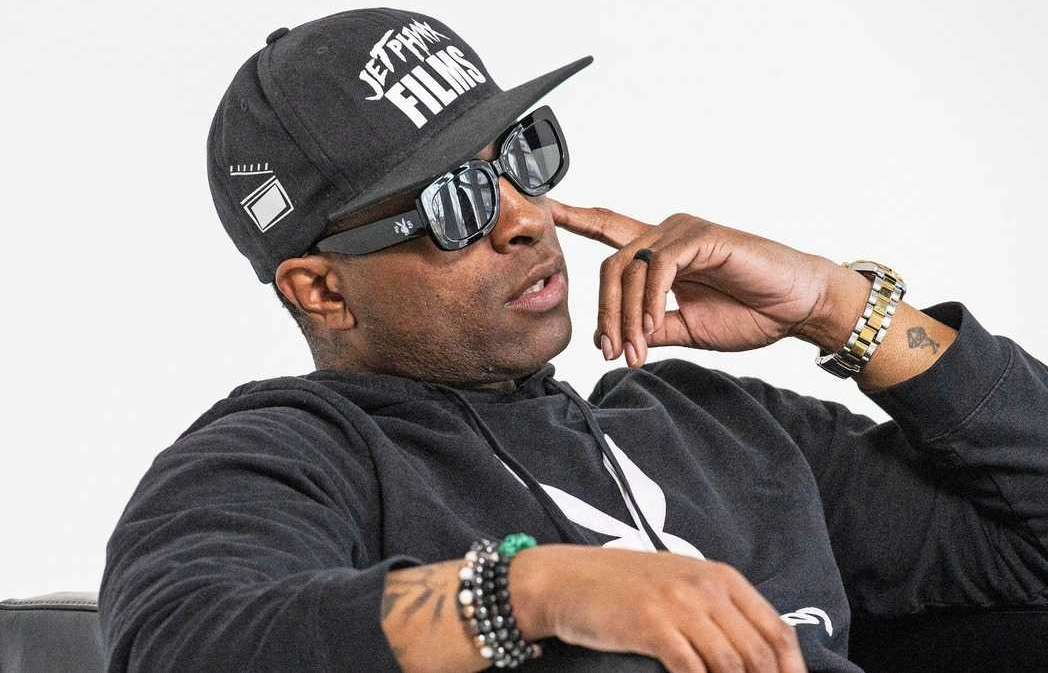What does that look like? For starters, Market Street in Wilmington would serve as a one-stop “mall” for creatives, where you could find designers, coders, printers, musicians and filmmakers among the local restaurants and coffee shops.
He’s a proponent of Delaware, with its urban, rural and coastal locales, as a destination for filmmakers looking for the perfect place to shoot their movies. He’s also a proponent of AI — as in, “If you don’t want to embrace it, you’re gonna get behind.”
“We built our studio downtown on Market Street,” Phynx (pronounced like Phoenix) told Technical.ly. “I started reaching out to the mayor and helping out in the early days of HBCU Week and doing local stuff to show that I’m here to help the state of Delaware, bringing this philosophy that I have called the three C’s, which are culture, corporate and cinema.”
He’s also working on bringing talent to the state. Last October at a Delaware Entrepreneurial Summit panel on the local creative economy, screenwriter Kenyetta Raelyn explained why she moved from Los Angeles to Delaware during the pandemic:
“When I touched down [in Delaware], I wasn’t expecting all of the possibilities,” she said. “Jet showed all the places to film. The possibilities are limitless — but we have infrastructure to build up first.”
Phynx’s goal to transform the state through filmmaking is lofty, but when Phynx puts his mind to something, it has a tendency to get done.

The rise of Phynx
Back in the 2000s and barely out of his teens, Wilmington-born Phynx was a rising star in the music industry, cutting tracks with Kanye and hanging out on set with Miley Cyrus. He had a contract with Disney, and if producer Jimmy Iovine had had his way, he would be the next will.i.am.
It wasn’t the path he had planned. Growing up in Delaware and Maryland — he graduated from Elkton High — Phynx saw himself as an athlete, and a good one. He helped take his high school football team to state championships. As a Black teenager in the ’90s, sports was seen as the best chance for a financially secure future.
That is, except by his father, an interior artifacts designer who traveled the world and filled their home with Egyptian art and jazz music. His father, who had lost his vocal cords to throat cancer when Phynx was 9, never came to his football games. He had different hopes for his son.
When Phynx was 20 and still going by his given name, Parris Duncan, his father’s cancer came back. This time it was terminal.
On the day his father would pass, he sat Phynx down and told him to write his name, Parris, backward on a piece of paper, a space between the Rs. Through his rarely used electronic larynx, he told his son to look in the mirror. Phynx did.
SIR RAP
“He muscled up to say: ‘The world didn’t get to hear me. Make sure they hear you. Be my voice,'” Phynx said. “I didn’t get it. I’m being young, not taking this in as the moment. And I’m like … Alright, whatever.”
Phynx didn’t expect his father to die that day. He had little concept of mortality, even with the dire prognosis. It hit him hard. He was just out of high school and questioning his future, and in his grief, he thought more about Sir Rap.
He would become a rapper, he decided, with the encouragement of his friends. He would not, however, become Sir Rap. Nor did he want to go by Parris.
He would become a rapper, he decided, with the encouragement of his friends. He would not, however, become Sir Rap. Nor did he want to go by Parris.
A close friend helped with a new name. “‘Your pops has died,'” Phynx recalled him saying. “‘You’re going through these transitions, man. You got to take off, like a jet.'”
Then, after a moment: “You gotta rise from the ashes.” They looked at each other. “Like a phoenix.”
“I wrote the word Phoenix, and I don’t really like the way it looks. It’s just not right,” Phynx said. “And I’m thinking about my dad. I’m thinking about the situation. I’m thinking about Egypt and the Sphinx.” After some reworking of the word in his notebook, he landed on Jet Phynx.
From a Delaware gig to a mixtape in Philly to a record label in New York to the Disney contract in LA, and eventually Iovine’s pop group, it was a hectic few years.
“I spent a lot of time watching movies, because that’s all I really had time for,” he said. “So I really developed a love for all different types of movies, and how they were put together. I was always interested anytime I stepped on set.”
He was becoming less interested in being a pop singer. After three years in the group, he decided he wanted to do something different. He wanted it so badly he was willing to break his contract even though it would leave him broke.
A ‘normal’ life
He returned to his mother’s house, nearing 30 and feeling lost. He met the woman who would become his wife, and they had a son. Maybe, he thought, a “normal life” was what he wanted.
The pull to create was strong, and Phynx soon cut another song on his own. He needed to get a video made as affordably as possible. As it happened, his then-future-wife’s mother had a decent camera, which he used to make that first video, not knowing that his entire path would turn toward filmmaking.
The business started, as these things often do, with one friend asking if he could film their music video. After a year, Phynx had made 200 videos at the bargain basement price of $150 a pop. That was the plan (though the original goal had been 100 videos): A year of building up a portfolio with little profit, then he would raise his rates.
His first big contract was with Under Armour. An acquaintance at the company had admired his music video style and pushed for him to get on the project. Turnaround was fast, but he got it done on time, and the company loved it.
After a stint as a volunteer intern for a film crew contracted in Wilmington for a two-month shoot, he was ready to take the next step.
“I ended up looking for the best photographer, the best graphic designer, the best social media person, the best editors, and then I started pitching decks and getting jobs,” he said. “We started working with huge brands from Roc Nation to Coca Cola and South by Southwest.”
‘The New Basketball’
That third “C,” for culture, comes through in everything he does, including his commitment to inspiring young Black kids and giving them another option beyond sports for a pathway to success.
“The videographer is cool right now,” he said. “I’m known as the ‘Michael Jordan of the camera,’ so I use that as a marketing tool.”
His biggest slogan right now is “Cameras: The New Basketball,” and he’s working on a campaign encouraging young people to pick up a camera instead of a gun — even if the camera is a smartphone.
“It doesn’t matter if it’s a phone,” Phynx said. “It has a lens attached to it to capture video. To me, that’s a camera.”
Phynx will be showcasing Black and Indigenous filmmakers from Delaware, Maryland, New Jersey, Pennsylvania and New York for the second year with the Dirty Popcorn Festival at the Delaware Art Museum on Aug. 12. This year, there will be more focus on supporting aspiring local filmmakers.
“Last year I didn’t have that much support,” he said. “I put my own money into it. Out of 162 submissions, only six were from the state of Delaware. That made me realize that this year I want education. It’s more about going from taking your iPhone and shooting something ‘regular’ to shooting a film with an iPhone.”







